Former Jordan MP promotes anti-LGBTQ+ Twitter campaign
Escalation in anti-LGBTQ+ activity takes place as Jordan adopts draconian amendments to cybercrime law
Former Jordan MP promotes anti-LGBTQ+ Twitter campaign
Share this story
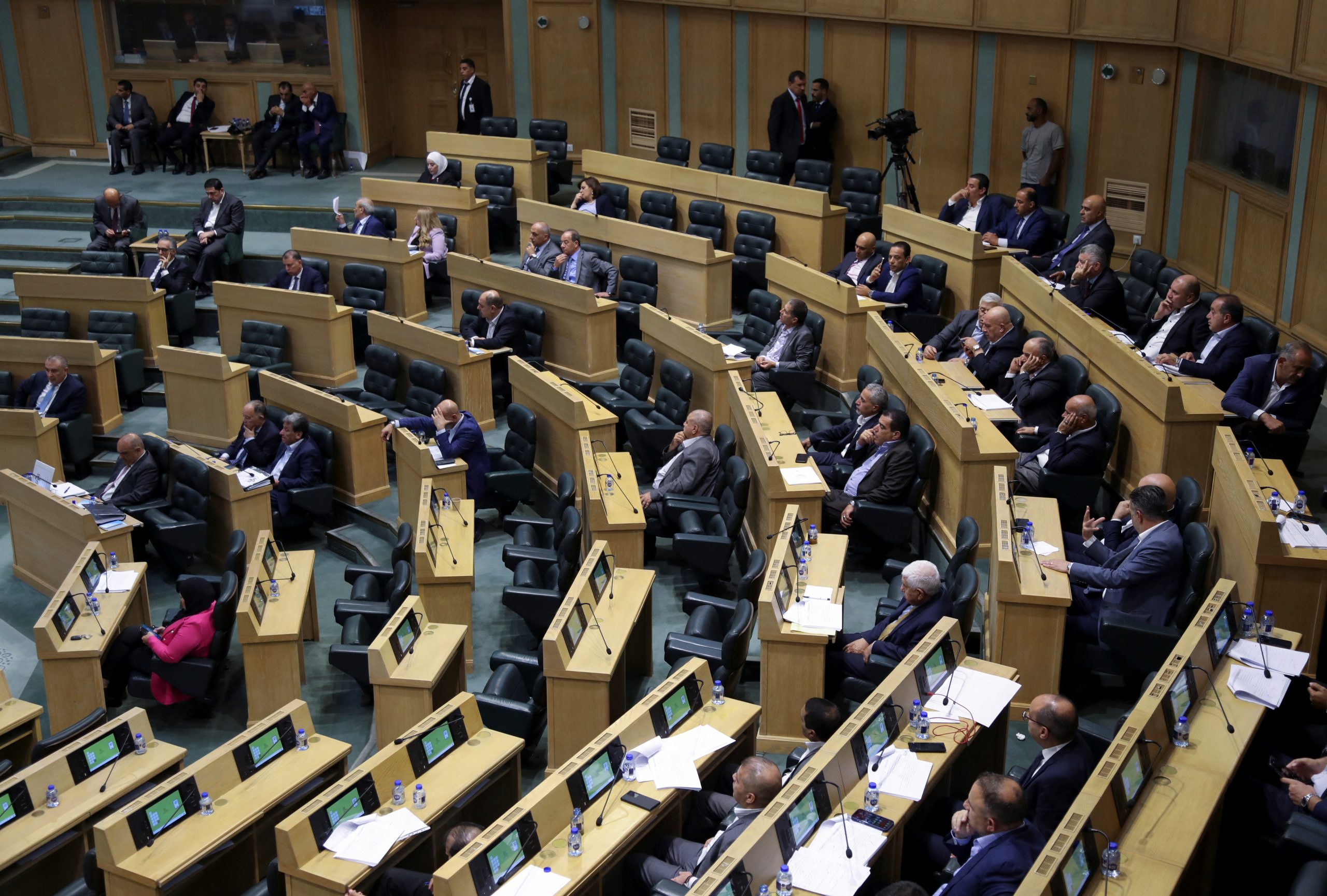
BANNER: Members of parliament attend a parliament session on the cybercrime law, in Amman, Jordan July 27, 2023. Source: (Reuters/Alaa Al Sukhni)
Note: This article includes quotes containing anti-LGBTQ epithets.
Twitter accounts in Jordan participated in an anti-LGBTQ+ campaign in July at the invitation of a former parliamentarian, Dima Tahboub. The tweets amplified by Tahboub and her supporters promoted content that carried false and hateful messages against LGBTQ+ individuals. The DFRLab monitored online statements from Tahboub and reactions from her supporters, including hashtags expressing support for Tahboub and rejecting homosexuality.
In a July 12 tweet, Tahboub invited online users to “participate in the digital storm in rejection of the targeted campaigns and malicious ideas that seek to distort our community.” Tahboub called on users to tweet using the hashtag #فطرة (“human instinct”). The DFRLab previously covered an online anti-LGBTQ+ campaign that originated in Egypt that utilized the same hashtag. The Egyptian campaign was short-lived, but it spread to Morocco and gained two million followers on Facebook before Meta removed the campaign’s official Facebook and Instagram accounts.
Tahboub’s invitation to amplify anti-LGBTQ+ rhetoric comes as the LGBTQ+ community across the Middle East and North Africa faces escalating crackdowns. LGBTQ+ individuals across the region have been the target of digital and physical harassment and arbitrary arrests. The escalating online targeting and physical attacks against the LGBTQ+ community in Jordan have been exacerbated by recent amendments to Jordan’s cybercrime law, which can be used to target LGBTQ+ individuals and limit their activism and free expression. Moreover, the Jordanian government blocked, effective August 9, access to Grindr, a dating app used by gay, bi, trans, and queer people.
On June 25, weeks before Tahboub’s post encouraging a tweetstorm campaign using the hashtag, she tweeted a photo showing rainbow colors projected on a bridge in the Jordanian capital of Amman. Tahboub tweeted that she confirmed with the municipality of Amman that the picture of “Abdoun Bridge lit with the homosexuals’ flag is fabricated” and Jordan “will remain disobedient to all forms of deviation.” One day later, Tahboub shared on Twitter an article claiming there is international consensus on LGBTQ+ couples not having the right to marriage.
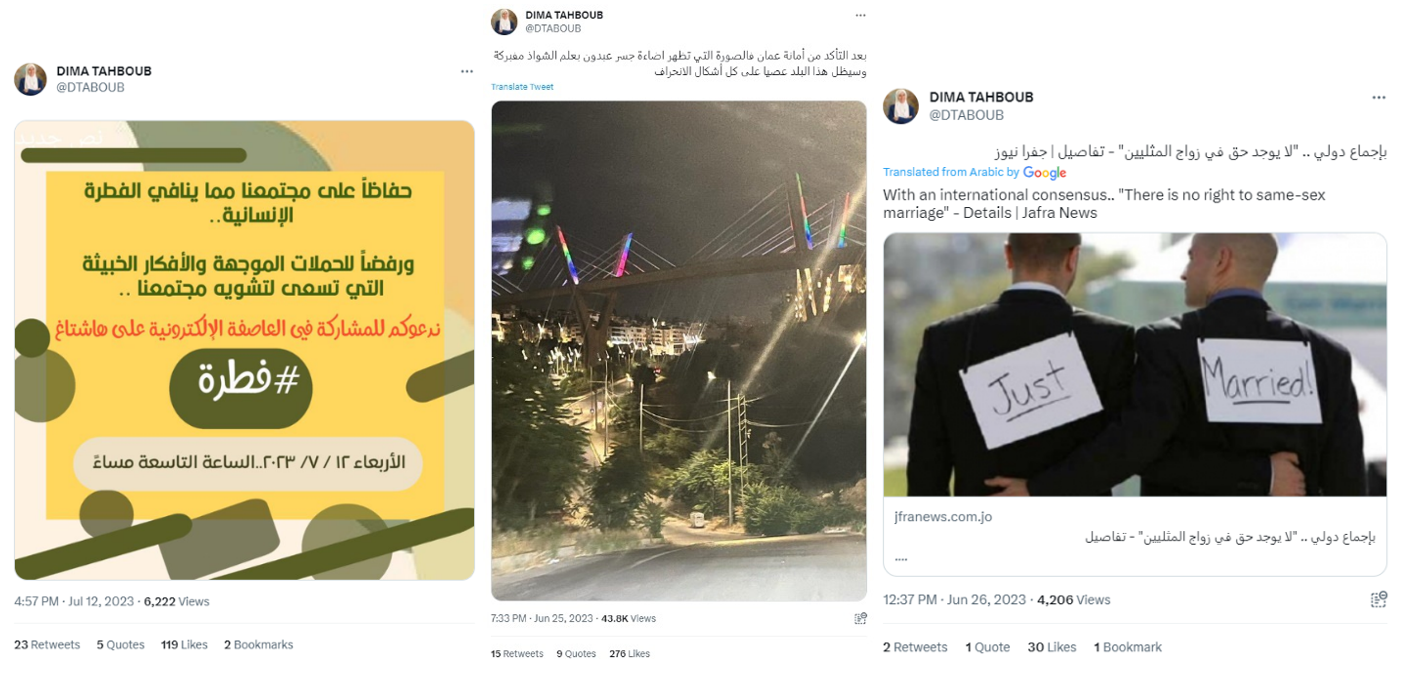
On July 1, the activist Twitter account @LGBTJordan posted screenshots of Tahboub’s tweets, condemning her for posting anti-LGBTQ+ content while Jordan grapples with issues such as unemployment, domestic violence, and child labor. The following week on July 9, @LGBTJordan posted a Twitter thread labeling Tahboub as “Jordan’s Icon of Hatred” and listing previous anti-LGBTQ+ positions that Tahboub took during her time as an elected official in parliament.
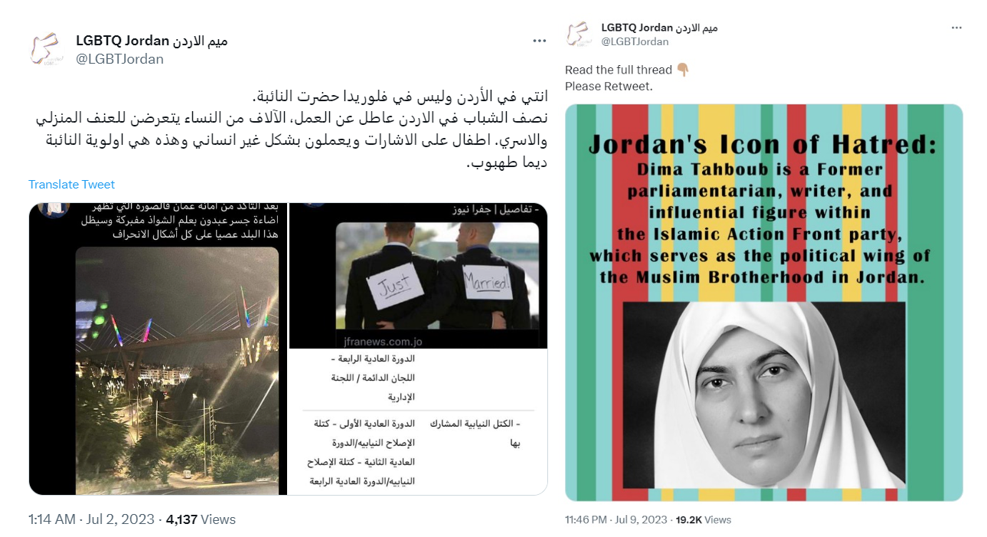
Tahboub won a parliament seat in the 2016 Jordanian general election, representing the Islamic Action Front (IAF) party, a political offshoot of the Muslim Brotherhood in Jordan. Tahboub has claimed on Twitter that during her time in office, she led a complaint to block access to the online magazine My Kali, which, according to its website, strives to “empower the youth to defy mainstream gender binaries in the Arab world.” However, My Kali denies that Tahboub was behind the blocking of the magazine’s website, noting that the block went into effect in July 2016, three months before Tahboub took office in September 2016.
Tahboub also led an effort to ban Lebanese indie band Mashrou’ Leila, whose lead singer is openly gay, from performing in Jordan. In media interviews, Tahboub confirmed that her position is that homosexuals aren’t welcome in Jordan.
#فطرة (“human instinct”)
On July 12, Tahboub called on Twitter users to start using the hashtag #فطرة (“human instinct”) that evening at 9 PM local time. Data from Meltwater Explore on the use of the hashtag in Jordan from July 12-23, 2023, reveals that the hashtag received only fifty-five mentions by twenty-eight users in twenty original tweets, which received twenty-three retweets and nine quote tweets.
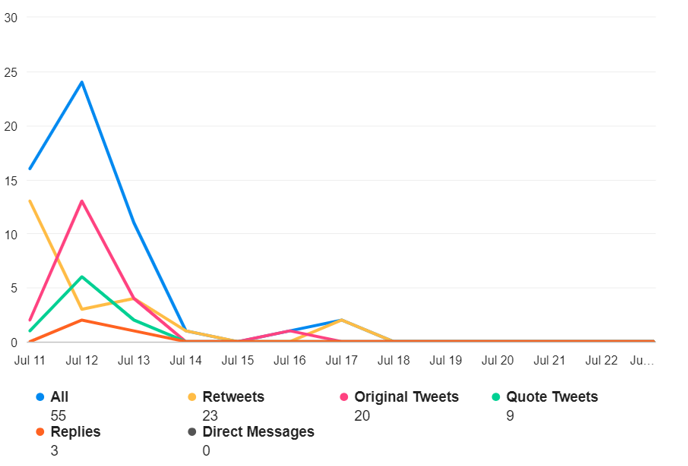
Some Twitter users posting in support of Tahboub utilized the hashtag and included one or more of the following hashtags in their post, listed in the order of popularity: #Fetra (transliteration of the word “human instinct” in Arabic); #لا_للشواذ (“no to homosexuals”); #ديمة_تمثلني (“Dima represents me”); #dimatahboub; #ديمة_طهبوب (“Dima Tahboub”); and #ديمة_طهبوب_تمثلنا (“Dima Tahboub represents us”).
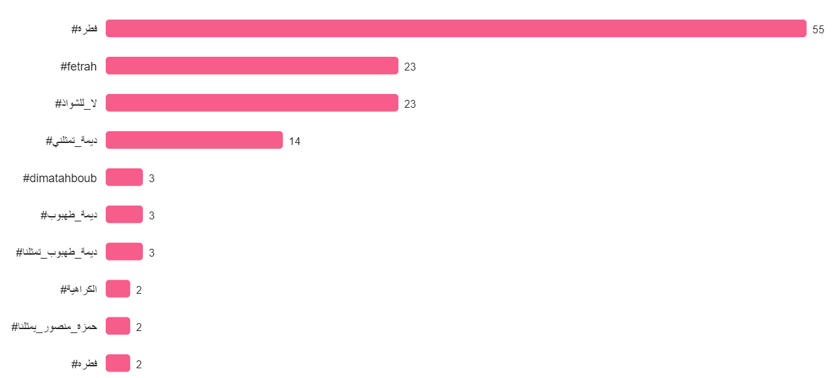
Tahboub’s online supporters conveyed their support by tweeting one or more of the hashtags. Some specified in their tweets that their support for Tahboub is because she is “against homosexuals.” Twitter user @derarshraim_2 quoted @LGBTJordan’s thread with a two-tweet thread that used three of the abovementioned hashtags; the thread expressed that homosexuals are the reason for the spread of diseases. The second tweet from @derarshraim_2 cited a 2020 article about a proposed amendment to lift the restriction on LGBTQ+ individuals donating blood in France. Further, the user @raedfutyan tweeted the hashtag #ديمة_طهبوب_تمثلنا (“Dima Tahboub represents us”) with the comment, “Animals reject homosexuality, and you won’t find an animal doing this, animals ascended, and some went lower than them.” In addition, @mohamma10675186, who also used two hashtags in his tweet, said Tahboub was being attacked for her positions against “homosexuality and bestiality represented by CEDAW and the feminist movement,” referring to the Convention on the Elimination of All Forms of Discrimination Against Women.
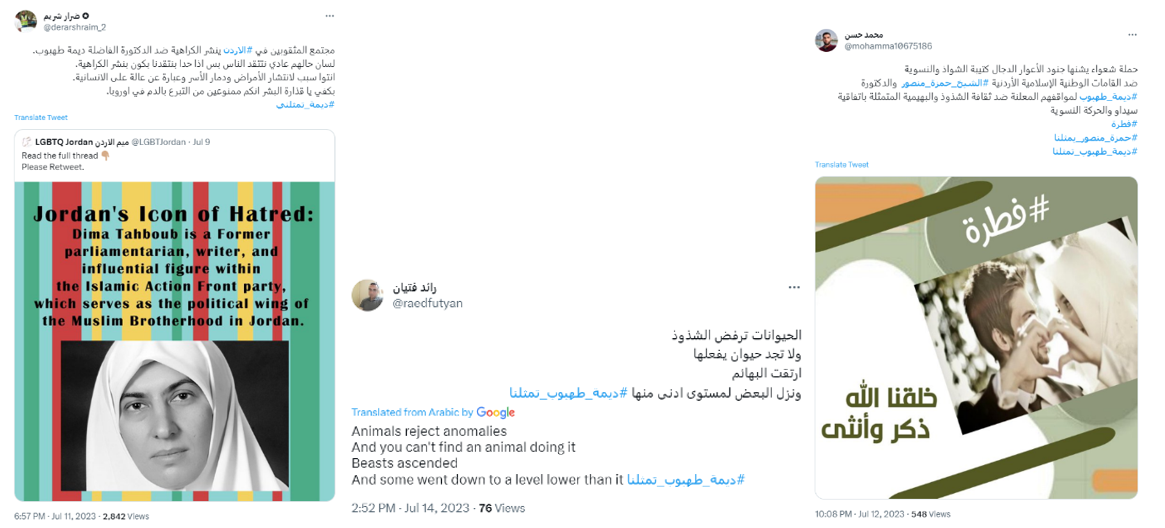
Politicians supporting Tahboub
Tahboub’s political party, the IAF, and the parliamentarian bloc the party is part of, the National Coalition for Reform, issued statements in July supporting Tahboub. The IAF statement was also posted on the website of the Muslim Brotherhood in Jordan. The IAF’s statement condemned what it referred to as an “incitement campaign by homosexual groups against its executive office member Dima Tahboub.” The statement warned against the “dangers” of these groups and their targeting of Tahboub through “demonization, incitement and hatred campaigns by publishing information full of inaccuracies against Tahboub.” The IAF’s statement also invited the authorities to prosecute those campaigning against Tahboub and “punish them legally and socially.”
The statement issued by the National Coalition for Reform, known as Islah, carried a similar message, condemning attacks against Tahboub from “websites that represent currents that support and promote deviant intellectual and moral trends, based on spreading the culture of homosexuality that is rejected religiously and morally.” Islah’s statement also demanded that the authorities “follow and prosecute groups that have not stopped targeting and sabotaging Jordanian society.”
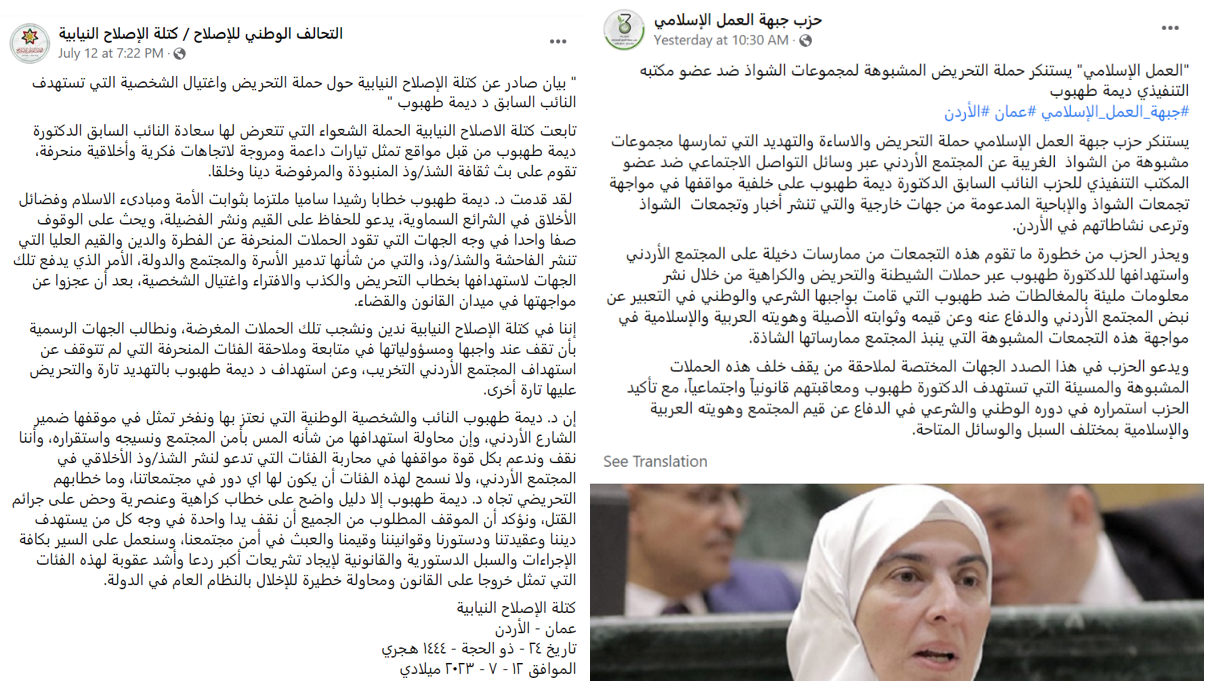
Former IAF parliamentarian Huda Etoom also issued a statement of support for Tahboub on her Facebook page. Etoom’s statement begins by referring to “moral deviation and homosexuality” as one of the greatest challenges and risks threatening society.
Another former parliamentarian, Adab Alsoud, said in a recent televised interview that she supports “burning till death” as a deterrent punishment for homosexuals. As clips from Alsoud’s interview circulated online, a few Twitter users shared messages of support using a hashtag of her name in Arabic. Tahboub retweeted a post expressing support for Alsoud amid the attacks she faces from people, which stated, “We reject their presence among us morally, religiously and socially and who attack everything related to human instinct and humanity that God has honored.”
Hate speech and cybercrime law in Jordan
The online controversy surrounding Tahboub comes amid concerns over freedom of expression in Jordan. Despite widespread opposition, on August 12, the King of Jordan approved controversial amendments to the country’s cybercrime law. The amendments place more power in the hands of Jordanian authorities to prosecute individuals and control online speech and access to the internet and digital spaces in the country. The amendments appear to criminalize sending or publishing false news, slander, or insults online and the use of virtual private networks (VPN), which are used by some to bypass the government’s December 2022 TikTok ban.
To express their opposition to the amendments, online activists circulated an announcement inviting users to participate in an electronic campaign using the hashtag #دولة_مش_سجن (“A state, not a prison”). Jordanian activist Hasan Kilani circulated the announcement with a tweet expressing that passing the law would violate “the right of every internet user in Jordan, and a threat to the economic interests of all those who resort to social media platforms to advertise their businesses.” The announcement was also circulated by the Al-Hirak Al-Mowahad movement, whose members have been targeted by the Jordanian authorities, and the banned My Kali magazine.
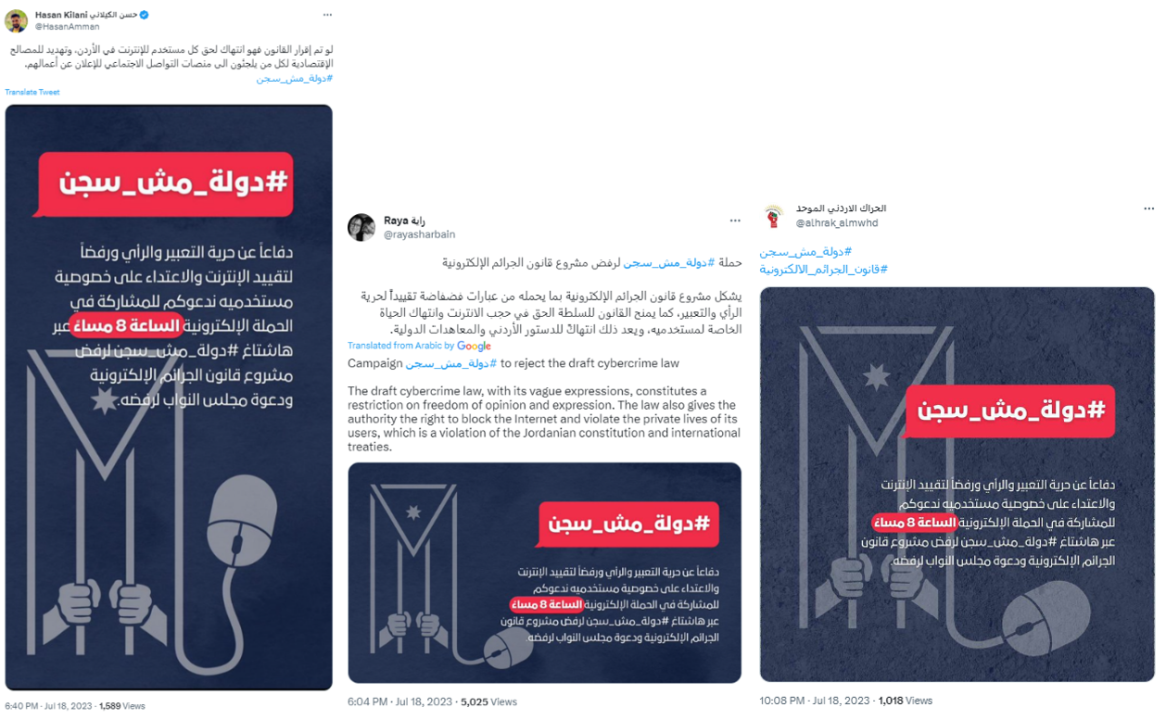
Tahboub was in favor of previous amendments to the law in 2017, which aimed to address hate speech on social media. Notably, in 2017, Tahboub filed a slander and defamation complaint against Jordanian activist Rakan Hiasat for sharing on Facebook a doctored poster showing Tahboub riding a horse and carrying a sword. Tahboub eventually dropped the charges against Hiasat.
On July 20, 2023, Tahboub retweeted a statement demanding the withdrawal of the draft cybercrime law, which the IAF is a signatory of, expressing that the amendments are a danger to civil and political liberties in Jordan. Rights groups also issued a statement urging Jordanian parliament to “reject the draft law and to safeguard the digital rights of all people in Jordan.”
In a 2018 letter published in the Jordan Times titled “Social or anti-social media?” Jordan’s King Abdullah spoke about issues related to rumors and misinformation as a global trend impacting Jordanians and the need for laws to address the matter. In the same letter, King Abdullah stated that online tools and technologies are a “means for me to listen to citizens’ thoughts and opinions, as much as possible, unfiltered, without mediators, barriers or restrictions.” But the ongoing digital crackdowns targeting media and human rights activists reflect systematic efforts to limit freedom of speech in Jordan, contradicting the king’s wishes to listen to his citizen’s thoughts and opinions.
Cite this case study:
Dina Sadek, “Former Jordan MP promotes anti-LGBTQ+ Twitter campaign,” Digital Forensic Research Lab (DFRLab), September 5, 2023, https://dfrlab.org/2023/09/05/former-jordan-mp-promotes-anti-lgbtq-twitter-campaign.

